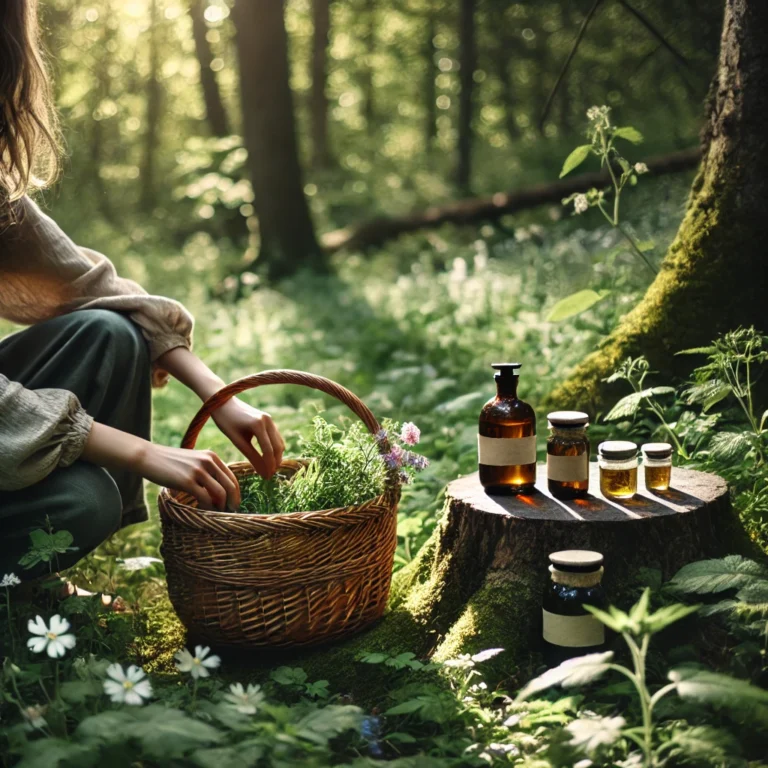Wild Medicinals are a treasure trove of natural health remedies just waiting to be discovered in the great outdoors. With a little knowledge and preparation, you can transform foraged herbs into powerful tinctures that support your health and self-reliance. This skill is not only practical but deeply rewarding, connecting you to nature in a meaningful way.
What Are Tinctures, and Why Make Them?
Tinctures are liquid extracts made from herbs, usually soaked in alcohol or vinegar, to preserve their medicinal properties. These compact and shelf-stable remedies are perfect for storing in your bug-out bag, medicine cabinet, or first-aid kit.
Foraging the herbs yourself means you’ll know exactly what goes into your tinctures—no mystery chemicals, just pure natural goodness.
Learning to create tinctures is not difficult, and once you know the basics, you’ll have a handy tool to address everything from minor aches to seasonal colds.
Foraging Basics: Safety First
Before you begin crafting tinctures, you need to gather your ingredients. Here’s a checklist for safe and responsible foraging:
- Know Your Plants: Learn to identify herbs confidently. Start with easy-to-recognize plants like dandelion, plantain, or yarrow.
- Pick Clean Areas: Avoid areas sprayed with pesticides or near busy roads where pollution may affect plants.
- Sustainable Harvesting: Only take what you need, leaving plenty behind for the ecosystem and future growth.
Foraging books, apps, and local guides are excellent resources to help you get started.
Supplies You’ll Need
Crafting tinctures at home doesn’t require much equipment. Gather these essentials:
- Clean, sealable jars (mason jars work well).
- High-proof alcohol (vodka or brandy are great options).
- Fresh or dried foraged herbs.
- Cheesecloth or fine strainer.
- Labels and markers for organization.
Step-by-Step: Making Your First Herbal Tincture
1. Prepare Your Herbs
Wash and chop your herbs into small pieces to expose as much surface area as possible. This step ensures that the medicinal compounds are efficiently extracted.
2. Fill Your Jar
Place the herbs in your jar, filling it about halfway. For stronger tinctures, pack the jar more tightly.
3. Add Alcohol
Pour your chosen alcohol over the herbs until the jar is full. Ensure all plant material is submerged to prevent mold.
4. Label and Wait
Seal the jar and label it with the herb name and the date. Store it in a cool, dark place, shaking it gently every few days. Allow the mixture to steep for 4-6 weeks for full potency.
5. Strain and Store
After steeping, strain the liquid through cheesecloth into a clean bottle. Squeeze the cloth to get every drop of goodness. Store your finished tincture in amber dropper bottles to protect it from light.
Top Herbs for Beginners
Some herbs are versatile and easy to find, making them perfect for beginner tincture makers:
- Dandelion: Supports liver health and detoxification.
- Plantain: Known for wound healing and soothing inflammation.
- Yarrow: Helps with colds, fevers, and minor bleeding.
- Elderberry: Boosts immunity during flu season.
- Chamomile: Calms the nerves and aids digestion.
How to Use Your Tinctures
Tinctures are highly concentrated, so a little goes a long way. The standard dosage is typically 1-2 dropperfuls diluted in water or tea, but always research the appropriate amounts for specific herbs.
Tinctures can be used daily for overall wellness or as needed for specific issues like headaches or stress. Their versatility and potency make them an invaluable addition to any prepper’s toolkit.
The Joy of Self-Reliance
Creating tinctures from foraged herbs isn’t just about crafting remedies; it’s about reclaiming your connection to the land and embracing a mindset of self-sufficiency. This skill empowers you to take control of your health while building resilience for unexpected challenges.
So, grab a foraging basket, explore your local woods, and start turning nature’s gifts into powerful wild medicinals. You’ll find that the process is not only practical but deeply fulfilling.



